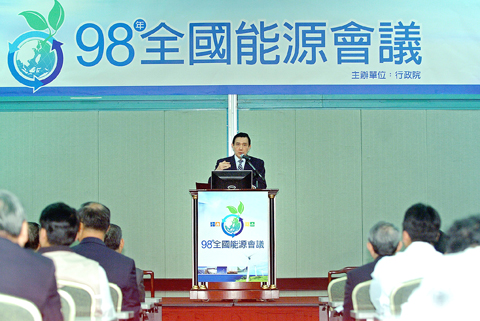President Ma Ying-jeou (馬英九) yesterday said legislators should condense eight versions of a bill on renewable energy as soon as possible and pass the negotiated version by the end of this session.
“We should do our duty as a member of the international community,” Ma said yesterday on the opening day of the National Energy Conference yesterday at the Taipei International Convention Center.
“I’m continuing my efforts when I was mayor of Taipei to make Taiwan more eco-friendly. The issue of sustainability is at the forefront of the agendas of all major governments right now. And it is on ours as well,” he said.

PHOTO: FANG PIN-CHAO, TAIPEI TIMES
A day earlier the Presidential Office had declined to take a stance on the renewable energy bill, saying it was a matter for the Executive Yuan to consider.
Ma said he had aggressive goals for reducing carbon dioxide emissions.
Taiwan ranked 22nd in the world in 2006 in terms of total carbon dioxide emissions, producing almost 1 percent of the world aggregate, the Energy Bureau has said.
“To have a clean environment for future generations, we seek to return to 2008’s carbon dioxide levels by 2020, 2000’s carbon dioxide levels by 2025 and half of 2025’s carbon dioxide levels by 2050,” Ma said.
Ma also promised to establish 60,000 hectares of national parks in Chiayi, Pingtung and Hualien counties, and another 1,000 hectares of national forest.
In response, Chinese Nationalist Party (KMT) caucus secretary-general Yang Chiung-ying (楊瓊瓔) said the caucus was ready to support the bill.
The different versions of the bill were referred to cross-party talks on Jan. 8, Yang said, calling on legislators across party lines to help the final version clear the floor by the end of the spring session.
KMT caucus deputy secretary-general Lin Hung-chih (林鴻池) blamed the Democratic Progressive Party (DPP) caucus for stalling the bill.
Lin said the versions had been stalled for seven years in the legislature because the DPP had not pushed the bills during the first six of those years when it was in power.
The DPP did not, however, control the legislature while in power.
Lin said reaching a consensus on one version of the renewable energy bill was difficult.
DPP Legislator Chen Ting-fei (陳亭妃) said the KMT caucus, which has a majority in the legislature, had consistently boycotted the bill, preventing it from proceeding to a vote.
Chen said the KMT caucus had refused to send the bill to cross-party negotiations until now and that it had clearly stalled the bill on purpose.
Chen said the KMT government shouldn’t try to fool the public.
Meanwhile, representatives of the nation’s six major industrial groups visited Premier Liu Chao-shiuan (劉兆玄) yesterday to convey their opinions on a bill to reduce carbon dioxide emissions.
Cabinet Spokesman Su Jun-pin (蘇俊賓) told reporters after the meeting that the groups had agreed that the legislation was needed, but had suggested that the Executive Yuan provide more details on its proposal.
But Su said the Executive Yuan would need to approve the proposed bill at today’s meeting of the Cabinet if it is to be sent to the legislature in time for it to be negotiated and passed during this session.
ADDITIONAL REPORTING BY RICH CHANG

Intel Corp chief executive officer Lip-Bu Tan (陳立武) is expected to meet with Taiwanese suppliers next month in conjunction with the opening of the Computex Taipei trade show, supply chain sources said on Monday. The visit, the first for Tan to Taiwan since assuming his new post last month, would be aimed at enhancing Intel’s ties with suppliers in Taiwan as he attempts to help turn around the struggling US chipmaker, the sources said. Tan is to hold a banquet to celebrate Intel’s 40-year presence in Taiwan before Computex opens on May 20 and invite dozens of Taiwanese suppliers to exchange views

Application-specific integrated circuit designer Faraday Technology Corp (智原) yesterday said that although revenue this quarter would decline 30 percent from last quarter, it retained its full-year forecast of revenue growth of 100 percent. The company attributed the quarterly drop to a slowdown in customers’ production of chips using Faraday’s advanced packaging technology. The company is still confident about its revenue growth this year, given its strong “design-win” — or the projects it won to help customers design their chips, Faraday president Steve Wang (王國雍) told an online earnings conference. “The design-win this year is better than we expected. We believe we will win

Chizuko Kimura has become the first female sushi chef in the world to win a Michelin star, fulfilling a promise she made to her dying husband to continue his legacy. The 54-year-old Japanese chef regained the Michelin star her late husband, Shunei Kimura, won three years ago for their Sushi Shunei restaurant in Paris. For Shunei Kimura, the star was a dream come true. However, the joy was short-lived. He died from cancer just three months later in June 2022. He was 65. The following year, the restaurant in the heart of Montmartre lost its star rating. Chizuko Kimura insisted that the new star is still down

While China’s leaders use their economic and political might to fight US President Donald Trump’s trade war “to the end,” its army of social media soldiers are embarking on a more humorous campaign online. Trump’s tariff blitz has seen Washington and Beijing impose eye-watering duties on imports from the other, fanning a standoff between the economic superpowers that has sparked global recession fears and sent markets into a tailspin. Trump says his policy is a response to years of being “ripped off” by other countries and aims to bring manufacturing to the US, forcing companies to employ US workers. However, China’s online warriors